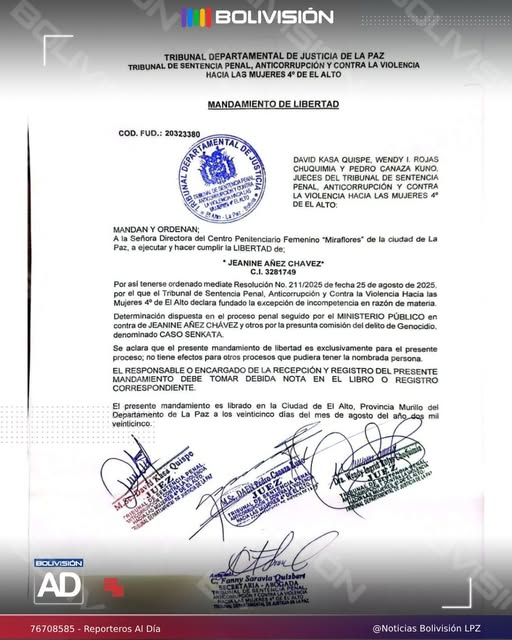On August 25, 2025, a court in El Alto, Bolivia, issued a landmark ruling by suspending the precautionary measures against former interim President Jeanine Áñez, ordering her immediate release along with twelve other defendants accused in the November 2019 Senkata repression.
The ruling, issued by Judge David Kasa of the Fourth Sentencing Court, acknowledges the “incompetence” of ordinary jurisdiction and transfers the case to a trial of responsibilities.


The judges of the Anti-Corruption and Violence Against Women Criminal Sentencing Court 4th in El Alto—David Kasa Quispe, Wendy I. Rojas Chuquimia, and Pedro Canaza Kuno—instructed the director of the “Miraflores” Women’s Penitentiary Center in La Paz to effect the immediate release of former President Jeanine Áñez Chávez in the case known as “Senkata.”
The decision has reignited debates about justice, political polarization, and the legacy of Bolivia’s 2019 crisis.
The Senkata case is tied to the events of November 2019, when Bolivia plunged into a political crisis following the resignation of Evo Morales, accused of electoral fraud in the October elections of that year.
During Áñez’s interim government, protests at the Senkata fuel plant in El Alto were suppressed by military and police forces, resulting in at least 20 deaths and over 200 injuries, according to reports from the Inter-American Commission on Human Rights (IACHR).
The IACHR described these events as a “massacre,” noting that the Áñez government authorized disproportionate operations, including the use of lethal weapons against protesters.
The court argued that, given Áñez’s status as a former president, the case should be handled through a trial of responsibilities, a process requiring the approval of two-thirds of the Legislative Assembly, which until recently was controlled by the Movement for Socialism (MAS).
“The precautionary measures are suspended, and the immediate release of the defendants is ordered, in compliance with the Constitution and international treaties,” stated Judge Kasa.
This resolution allowed for the release of Áñez, who had been detained since March 2021, as well as former military and police officers involved, including figures such as the former police commander Yuri Calderón.
During the hearing, broadcast via Zoom, relatives of the Senkata victims expressed their outrage.“Where is justice for us? Our loved ones were murdered, and now those responsible walk free,” exclaimed one family member.
But this seems to have more of a political backdrop than anything else.
Who could be behind this? There are speculations…
The broadcast was interrupted amid protests in the courtroom, reflecting the deep pain and distrust toward the judicial system.On the other hand, sectors supportive of Áñez, such as her daughter Carolina Ribera, celebrated the decision.
Ribera expressed her gratitude on social media for her mother’s release, describing it as an act of justice after years of struggle.
However, Áñez’s legal situation remains complex, as she faces nine additional judicial processes, including a ten-year sentence for the “Coup d’État I” case, related to her assumption of the presidency in 2019.
The political context is key to understanding this ruling. The recent defeat of the Movement for Socialism (MAS) in the August 18, 2025 elections, which left Evo Morales’s party out of the presidential runoff, has reduced its influence over the judicial system.It appears that the courts, previously criticized for being under the control of the ruling party, are showing signs of greater autonomy.
However, referring the case to the Legislative Assembly introduces uncertainty, as the MAS no longer holds the two-thirds majority needed to authorize a trial of responsibilities, which could delay or complicate the process.
Despite her release in the Senkata case, Áñez faces nine additional judicial processes, including a ten-year sentence for the “Coup d’État I” case, related to her assumption of the presidency in 2019. This suggests that her legal situation remains complex, and her freedom may be temporary.
The decision has also heightened social tensions, with sectors loyal to Morales threatening mobilizations if more opposition figures, such as Luis Fernando Camacho or Marco Pumari, receive similar rulings.
The release of Jeanine Áñez and the referral of the Senkata case to the Legislative Assembly mark a defining moment in Bolivia’s recent history.
The ruling that frees Jeanine Áñez and refers the Senkata case to the Legislative Assembly represents a turning point in Bolivia, suggesting a potential shift toward a more autonomous judiciary after years of accusations of politicization.
However, the decision also raises fears of impunity among the victims of 2019, who “feel” that the truth remains fragmented and that the information available to the Bolivian people is insufficient to heal the wounds of the crisis.
In a country where distrust in institutions persists, the challenge lies in ensuring a transparent process that clarifies the facts without succumbing to the pressures of polarization.
Only then can Bolivia move toward reconciliation that honors both justice and the memory of those who perished.
About The Author
Post Views: 1
👁️ 1 vistas

















